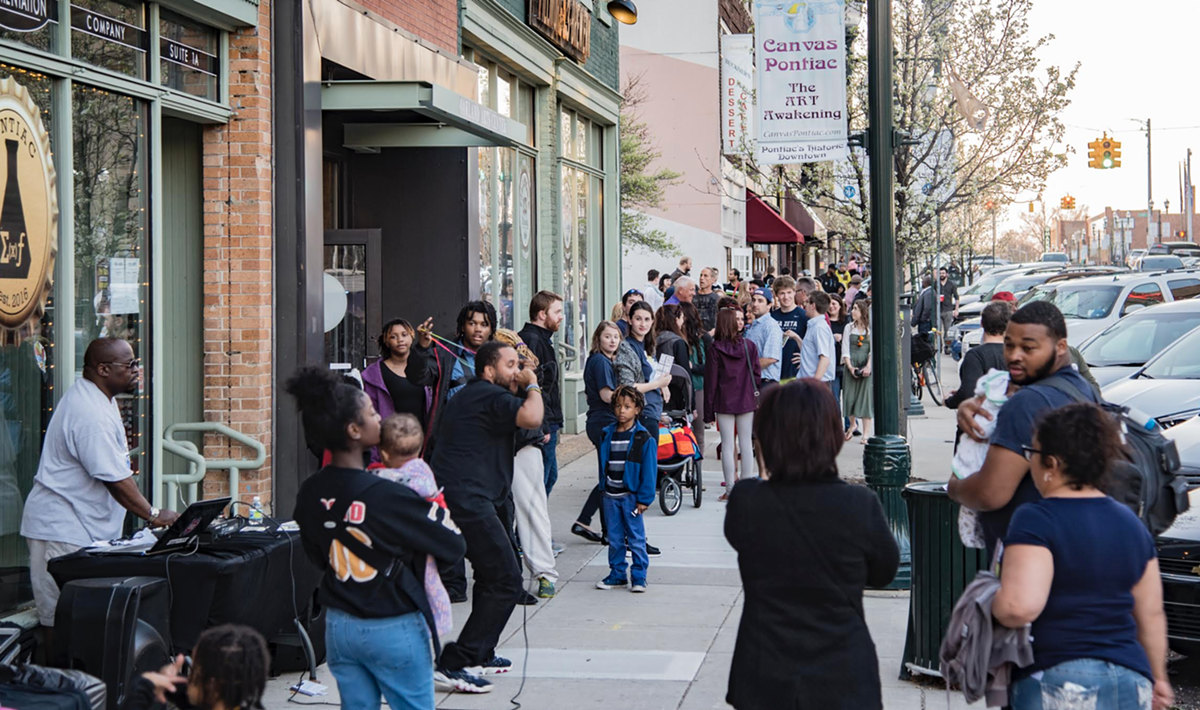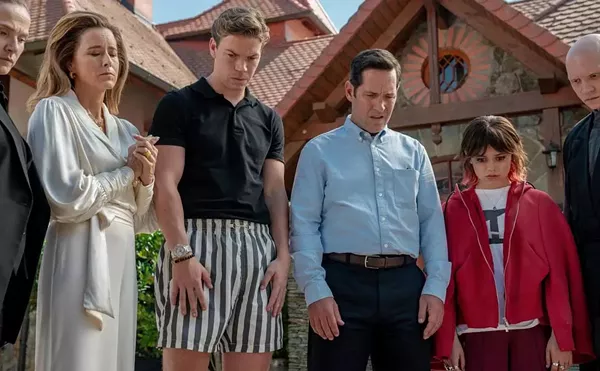On a guided tour by civic booster and community activist Michael McGuinness, Pontiac can feel like the biggest small town. It is no exaggeration to say that not only does he appear to know everyone we cross paths with on the street by name, but he also has an encyclopedic knowledge of their astrological signs, which he rattles off cheerfully.
He has equal if not more enthusiasm for Pontiac, which, like many Rust Belt cities, has seen better days. But there's lots for someone like McGuiness to be excited about lately.
New bars and restaurants are repopulating the city's downtown. There's the former Strand Theatre, recently restored as the Flagstar Strand. Some buildings are being restored to their former glory, with chintzy facades installed during the '60s now being removed to reveal the city's forgotten old-school downtown charm. Many refurbished apartments now have waiting lists. And of the buildings that are vacant, McGuiness says they'll likely not be for much longer.
It's also earning a name as an arts city.
McGuinness and Renee Voit-Porath, both of the Pontiac Arts Commission, offer the tour as they go door-to-door, passing out fliers for the second annual Pontiac Arts Crawl, which will be held on the first Friday of May in conjunction with revitalization nonprofit Main Street Pontiac. The two say the inaugural Pontiac Arts Crawl was founded, in part, to fill the void left behind by Arts, Beats & Eats — the multi-day arts festival Pontiac hosted from 1997 until 2010, when festival producer John Witz cut a $1 million deal to move the fest to Royal Oak.
"I personally have not gone since," McGuiness says with a smile.
The Pontiac Arts Crawl may lack the big-name musical acts or attendance numbers of Arts, Beats & Eats, but McGuiness and Voit-Porath consider the first year a success, estimating that more than 2,200 people attended. Local musicians were booked, businesses stayed open, and pop-up spaces activated vacant buildings.
"I got to say, at night last year, I was almost about to cry," Voit-Porath says. "It was really beautiful to see. I just saw so many different kinds of people out there, and everybody is getting along, and it seems like the tulips opened up that day."
Sean Preston, a local rap artist and entrepreneur, agrees. "It was like a real small glimpse of what our community is and what we have to offer," says Preston, who established a Detroit vs. Everybody-esque city pride T-shirt brand called "Yaktown Don't Back Down." (Ponti-yak, Yaktown — get it?) "It was like foot traffic on both sides, he says. "Everybody giving each other hugs."
There are plenty of parallels between Pontiac and Detroit, but its story is closer to that of Flint's. Both cities transformed from horse-and-buggy hubs to become company towns for General Motors. At its apex in the late '70s, GM employed 34,000, and the city had more than 80,000 residents. Now, the city has some 60,000 residents.
"Whole sections of the city were carved out for General Motors' purposes, neighborhoods were leveled or streets closed, and it just really sort of, for lack of a better word, warped a lot of Pontiac's corners," McGuinness says. "It was more catering to this commercial behemoth because it was the lifeblood of the city."
Like Flint and Detroit, the decline of the auto industry and racial tensions gave way to population loss. Tensions were worsened in 1971 when the Ku Klux Klan firebombed school buses in retaliation to the late federal Judge Damon Keith's order to integrate the city's schools. At the outset of the Great Recession, GM closed its proving grounds, dealing the city another major blow.
But there have been improvements in recent years. Music clubs like the Crofoot and Elektricity have brought renewed energy to the city's downtown in the past decade. The Phoenix Center parking deck and amphitheater has a new lease on life, having recently exited six years of emergency management-induced litigation.
It can sometimes seem like every time the downtown takes a step forward, it takes another back. The Flagstar Strand was supposed to house an outpost of Detroit's popular Slows Bar B Q restaurant; those plans fizzled after just months. The sign of the abandoned restaurant still hangs on the outside of the building.
"It left a weird taste in people's mouths," McGuinness says. "Like, if Slows can't make it, who can?"
Danny Martinez, a local chef and owner of downtown Pontiac's charming and recently opened Alleycat Cafe coffee shop, says he sees parallels to Detroit's downtown renaissance. Martinez made a name for himself with his downtown Detroit cafe 1515 Broadway, where he famously offered customers a free cup of coffee if they purchased the crumbling next-door Wurlitzer Building. After seven years, Martinez decided it was time to move on to something new, and opened Alleycat Cafe within months of closing 1515 Broadway in 2015.
"Downtown Detroit really turned around quickly, with an infusion of a lot of money, and Dan Gilbert buying all the buildings, and the bankruptcy thing going through in a year and a half," Martinez says. "I drive through Pontiac every day, and I saw all these cool storefronts. So I started knocking on doors and windows and now I'm here. I was only out of business for six months. And since I've been here, everything that happened to me downtown is happening here. You know, there were lots of places opening up, there are things that are going on."
Other recent developments include the Exferimentation Brewing Company, a laboratory-themed brewery with classic video game consoles at the tables. Erebus, the owners of Pontiac's popular sprawling Halloween haunted house, have recently opened a trendy escape room attraction on the north side of town. There's the Pontiac Transportation Museum, a forthcoming automotive history and educational center that is set to open soon. And GM's old proving grounds have since become the M-1 Concourse, a race track and luxury garage for high-end gearheads.
"One of the things about Pontiac that my father told me decades ago is that it's manageable," McGuinness says. "I mean, we're talking seven and a half square miles. That's versus a 139 square miles in Detroit. The bar, in terms of moving the needle, is a lot more — I think — realistic."
The Pontiac Arts Crawl is from 5-10 p.m. on Friday, May 3 in downtown Pontiac; more information is available by calling 248-410-0702or or at facebook.com/pontiacartscommission.
Get our top picks for the best events in Detroit every Thursday morning. Sign up for our events newsletter.







